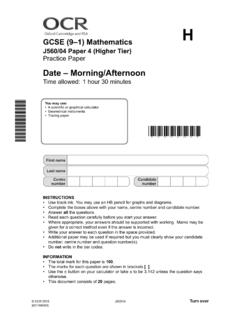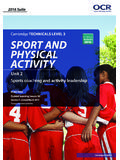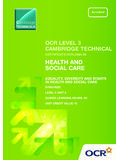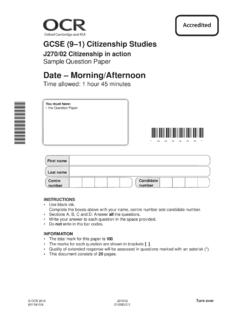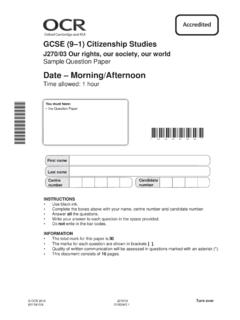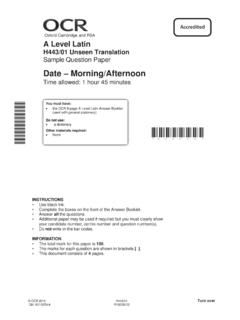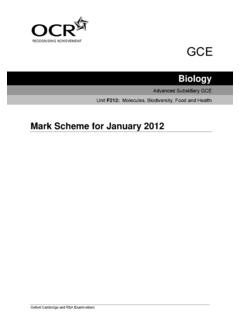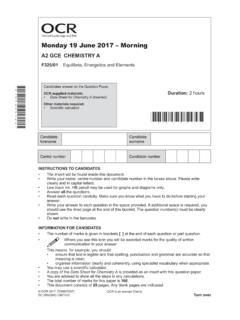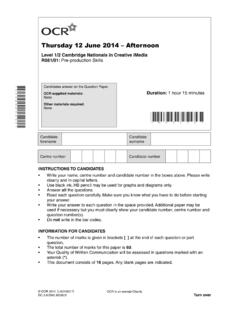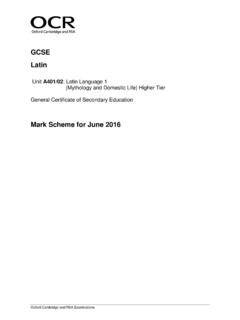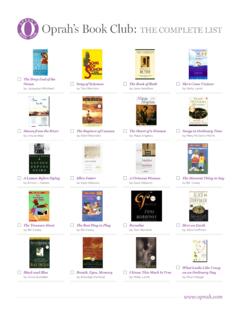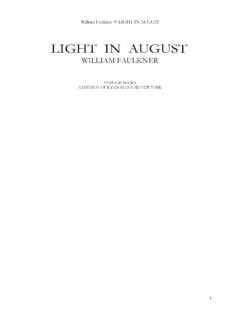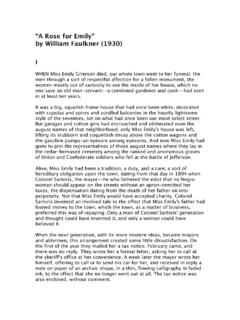Transcription of H472/02 A Level English Literature
1 Oxford Cambridge and RSA. A Level English Literature H472/02 Comparative and contextual study Thursday 22 June 2017 Morning Time allowed: 2 hours and 30 minutes * 6 8 2 9 1 8 7 3 0 0 *. You must have: the OCR 12-page Answer Booklet (OCR12 sent with general stationery). INSTRUCTIONS. Use black ink. Answer two questions from the topic you have chosen. Complete the boxes on the front of the Answer Booklet. Write your answer to each question on the Answer Booklet. Additional paper may be used if required but you must clearly show your candidate number, centre number and question number(s). Write the number of each question you have answered in the margin. Do not write in the barcodes. INFORMATION. The total mark for this paper is 60. The marks for each question are shown in brackets [ ]. This document consists of 16 pages. OCR 2017 [601/4725/8] OCR is an exempt Charity DC (LK) 139379/2 Turn over 2. Answer two questions from the topic you have chosen. American Literature 1880 1940.
2 Answer Question 1. Then answer one question from 2(a), 2(b) or 2(c). You should spend 1 hour and 15 minutes on each question. 1 Write a critical appreciation of this passage, relating your discussion to your reading of American Literature 1880 1940. [30]. He made everyone on the farm work as they had never worked before and yet there was no joy in the work. If things went well they went well for Jesse and never for the people who were his dependents. Like a thousand other strong men who have come into the world here in America in these later times, Jesse was but half 5. strong. He could master others but he could not master himself. The running of the farm as it had never been run before was easy for him. When he came home from Cleveland where he had been in school, he shut himself off from all of his people and began to make plans. He thought about the farm night and day and that 10. made him successful. Other men on the farms about him worked too hard and were too tired to think, but to think of the farm and to be everlastingly making plans for its success was a relief to Jesse.
3 It partially satisfied something in his passionate nature. Immediately after he came home he had a wing built on the old house and in a 15. large room facing the west he had windows that looked into the barnyard and other windows that looked off across the fields. By the window he sat down to think. Hour after hour and day after day he sat and looked over the land and thought out his new place in life. The passionate burning thing in his nature flamed up and his 20. eyes became hard. He wanted to make the farm produce as no farm in his state had ever produced before and then he wanted something else. It was the indefinable hunger within that made his eyes waver and that kept him always more and more silent before people. He would have given much to achieve peace and in him 25. was a fear that peace was the thing he could not achieve. All over his body Jesse Bentley was alive. In his small frame was gathered the force of a long line of strong men. He had always been extraordinarily alive when he was a small boy on the farm and later when he was a young man in school.
4 In the school he had studied 30. and thought of God and the Bible with his whole mind and heart. As time passed and he grew to know people better, he began to think of himself as an extraordinary man, one set apart from his fellows. He wanted terribly to make his life a thing of great importance, and as he looked about at his fellow men and saw how like clods they 35. lived it seemed to him that he could not bear to become also such a clod. Although in his absorption in himself and in his own destiny he was blind to the fact that his young wife was doing a strong woman's work even after she had become large with child and that she was killing herself in his service, he did not intend to be unkind 40. to her. Sherwood Anderson, Winesburg, Ohio (1922). OCR 2017 H472/02 Jun17. 3. In your answer to Question 2, you must compare at least two texts from the following list. At least one of these must be taken from the two texts given at the top of the list in bold type.
5 F Scott Fitzgerald: The Great Gatsby John Steinbeck: The Grapes of Wrath Henry James: The Portrait of a Lady Mark Twain: Adventures of Huckleberry Finn Theodore Dreiser: Sister Carrie Willa Cather: My ntonia Edith Wharton: The Age of Innocence william faulkner : The Sound and the Fury Ernest Hemingway: A Farewell to Arms Richard Wright: Native Son Either 2 (a) F Scott Fitzgerald: The Great Gatsby Characters in pursuit of money lie at the heart of much American Literature .'. By comparing The Great Gatsby with at least one other text prescribed for this topic, discuss how far you agree with this view. [30]. Or (b) John Steinbeck: The Grapes of Wrath American Literature often depicts a society which is cruel to its most vulnerable members.'. By comparing The Grapes of Wrath with at least one other text prescribed for this topic, discuss how far you agree with this view. [30]. Or (c) Much American Literature is characterised by the importance of hope in adversity.
6 '. By comparing at least two texts prescribed for this topic, discuss how far you have found this to be the case. In your answer you must include discussion of either The Great Gatsby and/or The Grapes of Wrath. [30]. OCR 2017 H472/02 Jun17 Turn over 4. The Gothic Answer Question 3. Then answer one question from 4(a), 4(b) or 4(c). You should spend 1 hour and 15 minutes on each question. 3 Write a critical appreciation of this passage, relating your discussion to your reading of the Gothic. [30]. The interminable rows of bare and blackening skulls the masses interposed of gaunt and rotting bones, that once gave strength and symmetry to the young, the beautiful, the brave, now mildewed by the damp of the cavern, and heaped together in indiscriminate arrangement the faint mouldering and deathlike smell that 5. pervaded these gloomy labyrinths, and the long recesses in the low- roofed rock, to which I dared not turn my eyes except by short and fitful glances, as if expecting something terrible and ghastly to start from the indistinctness of their distance, all had associations for my thoughts very different from the solemn and edifying sentiments 10.
7 They must rouse in a well regulated breast, and, by degrees, I yielded up every faculty to the influence of an ill-defined and mysterious alarm. My eyesight waxed gradually dull to all but the fleshless skulls that were glaring in the yellow light of the tapers the hum of human voices was stifled in my ears, and I thought myself alone, 15. already with the dead. The guide thrust the light he carried into a huge skull that was lying separate in a niche ; but I marked not the action or the man, but only the fearful glimmering of the transparent bone, which I thought a smile of triumphant malice from the presiding spectre of the place, while imagined accents whispered, 20. in my hearing, Welcome to our charnel-house1, for THIS shall be your chamber ! Dizzy with indescribable emotions, I felt nothing but a painful sense of oppression from the presence of others, as if I could not breathe for the black shapes that were crowding near me ; and turning unperceived, down a long and gloomy passage 25.
8 Of the catacombs, I rushed as far as I could penetrate, to feed in solitude the growing appetite for horror, that had quelled for the moment, in my bosom, the sense of fear, and even the feeling of identity. To the rapid whirl of various sensations that had bewildered me ever since I left the light of day, a season of intense abstraction 30. now succeeded. I held my burning eyeballs full upon the skulls in front, till they almost seemed to answer my fixed regard, and claim a dreadful fellowship with the being that beheld them. Daniel Keyte Sandford, A Night in the Catacombs' (1818). 1 Charnel-house: a building where human skeletal remains are stored. OCR 2017 H472/02 Jun17. 5. In your answer to Question 4, you must compare at least two texts from the following list. At least one of these must be taken from the two texts given at the top of the list in bold type. Bram Stoker: Dracula Angela Carter: The Bloody Chamber and Other Stories*. william Beckford: Vathek Ann Radcliffe: The Italian Mary Shelley: Frankenstein Oscar Wilde: The Picture of Dorian Gray william faulkner : light in august Cormac McCarthy: Outer Dark Iain Banks: The Wasp Factory Toni Morrison: Beloved *Candidates writing about The Bloody Chamber and Other Stories should select material from the whole text.
9 Either 4 (a) Bram Stoker: Dracula Gothic writing frequently explores the battle between good and evil.'. Consider how far you agree with this statement by comparing Dracula with at least one other text prescribed for this topic. [30]. Or (b) Angela Carter: The Bloody Chamber and Other Stories*. In Gothic writing, female characters are generally presented as victims.'. By comparing The Bloody Chamber and Other Stories* with at least one other text prescribed for this topic, discuss how far you agree with this view. [30]. Or (c) Suspense is a key feature of narrative in Gothic writing.'. By comparing at least two texts prescribed for this topic, discuss how far you have found this to be the case. In your answer you must include discussion of either Dracula and/or The Bloody Chamber and Other Stories*. [30]. OCR 2017 H472/02 Jun17 Turn over 6. Dystopia Answer Question 5. Then answer one question from 6(a), 6(b) or 6(c). You should spend 1 hour and 15 minutes on each question.
10 5 Write a critical appreciation of this passage, relating your discussion to your reading of dystopian Literature . [30]. In this passage, a totalitarian regime has convinced the population that they are at risk from a serious disease and now controls them by means of a regime of drugs. Adapted from G Valentine, 'Is This Your DayTo Join the Revolution?', , Futurismic - Near future science fiction and fact since 2001. Item removed due to third party copyright restrictions. OCR 2017 H472/02 Jun17. 7. Adapted from G Valentine, 'Is This Your DayTo Join the Revolution?', , Futurismic - Near future science fiction and fact since 2001. Item removed due to third party copyright restrictions. Genevieve Valentine, Is This Your Day To Join The Revolution?' (2009). 1 John Doe: In the US, a name given to any man whose true identity is unknown. OCR 2017 H472/02 Jun17 Turn over 8. In your answer to Question 6, you must compare at least two texts from the following list.
